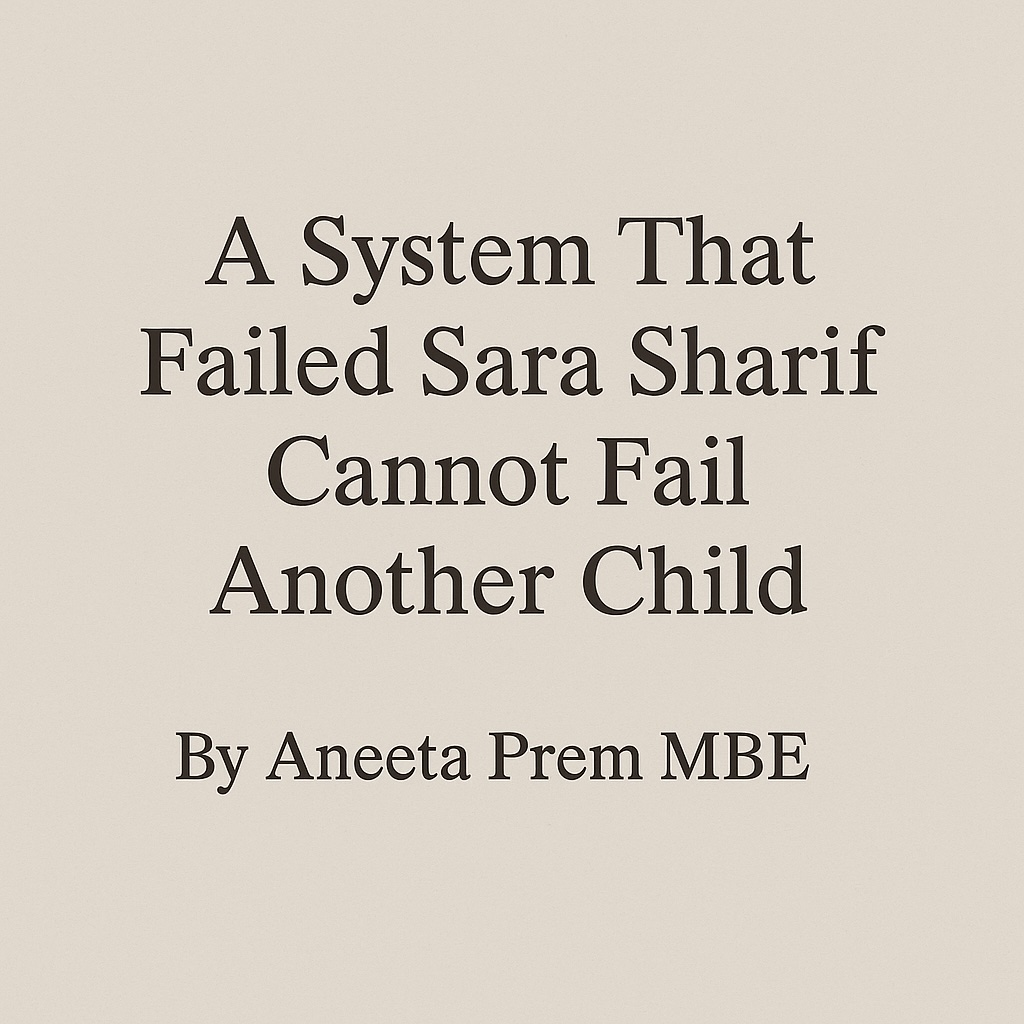
Ten-year-old Sara Sharif lost her life because a child who needed protection became invisible. Her case is one of the most serious safeguarding failures this country has faced. It shows how hesitation, fear, and missed opportunities can combine to leave a child without the safety they deserve.
Professionals saw injuries but did not ask why. Her behaviour changed. She wore a hijab to hide bruises. Her mother repeatedly asked for help, yet even in court she was left without an interpreter and unable to fully explain her concerns. Domestic abuse patterns were present but not treated as central. Information sharing between agencies broke down. And once Sara was withdrawn from school, she simply disappeared.
I have said many times:
“Sara wasn’t just out of school. She was out of sight. And when a child is out of sight, danger grows.”
This case demands honest reflection. Not blame, but responsibility. Not words, but action.
2016–2019
Professionals raised concerns about controlling behaviour in the home. Signs of domestic abuse were visible but not joined together.
2019
Sara was placed in the care of her father and stepmother. Her mother, without an interpreter, struggled to have her voice heard.
2020
During lockdown, oversight weakened. Sara became harder for services to monitor.
2021–2022
Teachers saw changes in her behaviour and raised concerns. None of these warnings were connected.
Early 2023
Her father began removing her from school. Some professionals hesitated to challenge him because they feared being accused of racism or cultural insensitivity.
Mid 2023
Sara was withdrawn from school entirely and home educated. Safeguarding checks ended. Professionals lost sight of her.
August 2023
Sara was found dead. The review confirms that escalating danger was not recognised and opportunities to intervene were missed.
This was not one mistake. It was a system that failed at multiple points.
Most families who home educate do so with love, care and commitment. Many children thrive at home, especially when schools feel overwhelming or unsafe. I support good home education. Parents should have choices that help children flourish.
But Sara’s case reveals a difficult truth. Home education can be used to hide abuse, neglect, dishonour-based abuse or forced marriage. At Freedom Charity, we see this pattern too often. When children leave school with no oversight, the risks increase sharply.
For more than a decade I have asked the same question:
How many children are taken out of school each year and forced into abuse or marriage?
The government’s reply is always the same:
They do not know.
If we cannot answer this question, we cannot protect the most vulnerable.
The Bill now before Parliament is a landmark moment for safeguarding. It places children’s safety at the centre of public service reform. The measures include:
• a national register of children not in school
• regular welfare and education checks
• limits on home education where safeguarding concerns exist
• a unique child identifier to improve information sharing
• schools formally involved in safeguarding decisions
• stronger expectations that concerns are recorded and acted on
• councils empowered to require school attendance where a home environment is unsafe
These measures do not restrict responsible parents. They protect children who are hidden, silent, or at risk.
This is not a debate about school versus home.
It is a debate about safety versus danger.
Every child deserves to be seen.
Safeguarding only works when professionals feel able to challenge, ask questions and share information without hesitation. Sara’s case shows what happens when fear — fear of being wrong, fear of being seen as racist, fear of causing offence — stops adults from protecting a child.
Respect for culture can never mean silence about abuse.
We must build a system where concerns are not left unspoken, patterns are recognised sooner, and no child falls into the gaps between agencies.
At Freedom Charity we work daily with children affected by forced marriage, FGM and dishonour-based abuse. We have donated more than 100,000 copies of But It’s Not Fair and Cut Flowers to schools, families and professionals. These books give children the language to ask for help and help adults recognise danger early.
Our work shows a simple truth:
When children are visible, they are safer.
When they are hidden, harm grows.
Sara should have been safe. She should have been heard. She should have been protected by the systems built to protect her.
Her story must lead to real, lasting change.
No child should ever become invisible again.

The books I wrote, how they are used in schools, and the safeguarding outcomes recorded

Taliban criminal code domestic violence; Afghanistan domestic violence law; domestic abuse impunity Afghanistan; Taliban justice system women

For some young people, even a Valentine’s card can trigger control, punishment and fear. Dishonour-based abuse often begins long before a wedding.
.jpg)
Rare Disease Day 2026 falls on 28 February. This is what the zebra stripes symbolise, and why equity for rare conditions must be measured in real systems, not slogans.

Kajal Saini and Mohammad Arman were found dead in Uttar Pradesh, and the language used to describe their murder matters.